NL Rookie of the Year: The Top 5 Contenders

With just a few weeks left in the regular season, the NL Rookie of the Year Award is a slam-dunk for a certain shortstop, but the battle for second place is still wide open.
The Rookie of the Year Award doesn’t seem to come with the same argument as the MPV Award. Namely, voters don’t regularly ding a rookie on a non-playoff team like they do when voting for the MVP Award. In the National League, three of the last five Rookie of the Year winners were on non-playoff teams. This includes Jose Fernandez in 2013, who was on a last place Miami Marlins team that went 62-100.
The Doggers franchise has collected the most Rookie of the Year Awards, going back to when Jackie Robinson won the inaugural award in 1947. There was only one award for all of baseball the first two years. The BBWAA didn’t start awarding Rookie of the Year Awards to both leagues until 1949. In the early days, the award was named after J. Louis Comiskey, who was the owner of the Chicago White Sox in the 1930s. The award was renamed the Jackie Robinson Award in 1987, 40 years after Robinson broke the color line in modern baseball.
Four of the first seven Rookie of the Year Awards were won by players from the Brooklyn Dodgers. After moving to Los Angeles, the Dodgers continued to pick up Rookie of the Year Awards at a healthy pace, with three trophies coming their way in the 1960s. From 1979 to 1982, the Dodgers had a monopoly on Rookie of the Year Awards when they won four straight. Rick Sutcliffe won it in 1979, Steve Howe took it in 1980, the Amazing Fernando Valenzuela won the Rookie of the Year and the Cy Young Award in 1981, and Steve Sax took the trophy for best NL rookie in 1982.
Winning four straight Rookie of the Year Awards wasn’t the best stretch the Dodgers have had. From 1992 to 1996, they won five straight: Eric Karros, Mike Piazza, Raul Mondesi, Hideo Nomo, and Todd Hollandsworth. Overall, Dodgers players have won 16 Rookie of the Year Awards. The Braves and Reds are tied for second, with seven wins each. Five teams have just one Rookie of the Year Award winner (Nationals, Astros, Brewers, Pirates, and Rockies).
As for this year’s award, well, it’s no secret that this year’s winner is likely to be wearing Dodger Blue when the award is announced after this season. Other than he who shall not be named (yet), these are the top contenders to finish in second place in the voting, starting with a group of players I have just outside of my top five.
Next: Good Rookies Outside My Top Five
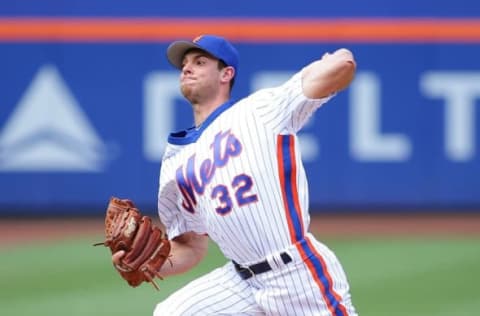
SP Steven Matz, New York Mets
132.3 IP, 9 W, 3.40 ERA, 1.21 WHIP, 8.8 K/9
After his impressive 35 2/3 innings in 2015, Steven Matz was a leading Rookie of the Year candidate coming into this season. He’s pitched well for the Mets, but is currently on the DL with a shoulder injury. His limited innings leaves him out of my top five, but he has a bright future if he can stay healthy.
RP Seung-Hwan Oh, St. Louis Cardinals
71.3 IP, 4 W, 16 SVS, 1.89 ERA, 0.90 WHIP, 12.0 K/9
St. Louis Cardinals reliever Seung-Hwan Oh is not your typically Rookie of the Year candidate. He’s 34 years old and pitched 11 seasons in Korea and Japan before coming to the U.S. in the off-season. He was expected to be a setup guy for the Cardinals, but the injury and ineffectiveness of Trevor Rosenthal gave Oh the opportunity to be the team’s closer and he’s run with it, currently sporting an ERA below 2.00 and a WHIP below 1.00. Of course, Oh is no stranger to closing. He had 357 saves in 11 seasons overseas, including seven seasons with 30 or more.
SP Junior Guerra, Milwaukee Brewers
110.7 IP, 7 W, 2.85 ERA, 1.12 WHIP, 7.6 K/9
Junior Guerra is another oddball Rookie of the Year candidate. He was originally signed by the Braves as an amateur free agent out of Venezuela in 2001. Since then, he’s pitched in the minor leagues in the U.S., the Hawaiian Winter League, the Venezuelan Winter League, and the Mexican League. The Brewers selected him off waivers from the Chicago White Sox last October after he pitched four big league innings in 2015. He started this year in Colorado Springs, then made his big league debut as starting pitcher on May 3 at the age of 31 and beat the Angels. His 2.85 ERA leads all National League rookie pitchers with more than 100 innings pitched.
SP Tyler Anderson, Colorado Rockies
96.7 IP, 5 W, 3.35 ERA, 1.20 WHIP, 7.8 K/9
Left-handed pitcher Tyler Anderson only has five wins, but a 3.35 ERA for a pitcher in Colorado is impressive. In fact, Anderson has a better ERA at home (3.04) than on the road (4.21), although his FIP is nearly the same (3.56 FIP at home, 3.62 FIP on the road). Anderson was the Rockies’ first round pick in the 2011 amateur draft. He and fellow rookie Jon Gray give the team some hope for their future starting rotation.
These four pitchers are having good debut seasons, but they are just outside of my top five. The following players are the true contenders to finish in second place in the 2016 NL Rookie of the Year voting, along with the easy winner this year.
Next: The Speedy Centerfielder
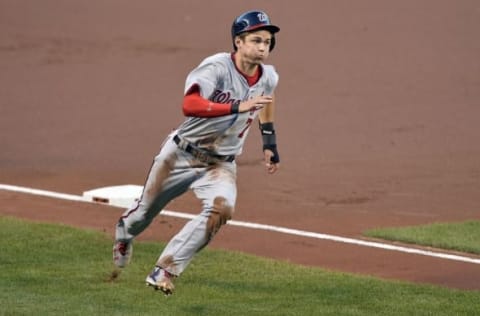
CF Trea Turner, Washington Nationals
218 PA, .344/.362/.541, 36 R, 6 HR, 27 RBI, 21 SB
Turner’s limited playing time may cost him some votes, but he’s currently leading off for the Nationals and has another 20-plus games to play, so he should get over 300 plate appearances before the regular season is over. In his first 50 big league games, Turner is slugging over .500 and has 21 steals, with just three times caught stealing. His speed is amazing, as he shows on this easy triple on a hit to right-center.
That was one of six triples Turner has hit this year. Only 10 players have more triples than Turner in 2016 and they all have at least 100 more plate appearances. The other thing to note about Turner is that his natural position is shortstop, which was the spot he played most of the year in Triple-A Syracuse. He’s played 24 games in centerfield for the Nationals after playing just six in centerfield in the minor leagues. Despite his limited experience at the position, Turner is rated an above-average fielder by Fangraphs and Baseball-Reference WAR.
Turner was a 1st round pick in the 2014 June Draft. Baseball America had him ranked #65 on their Top 100 prior to the 2015 season, then moved him up to #9 before this year. He has more than lived up to expectations so far.
Next: The Cardinals' Replacement Sparkplug
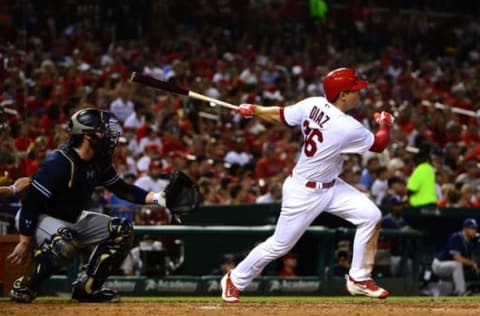
SS Aledmys Diaz, St. Louis Cardinals
401 PA, .312/.376/.518, 64 R, 14 HR, 57 RBI, 4 SB
When incumbent Cardinals shortstop Jhonny Peralta went down with a thumb injury in spring training, Aledmys Diaz was a relatively unknown player. He was signed as an amateur free agent out of Cuba in 2014 after being featured in a showcase with fellow Cuban defector Odrisamer Despaigne in February of that year. Diaz was not impressive in the showcase. Many clubs passed on him and some felt he was out of shape. The Cardinals took a chance and signed him to a four-year contract worth $8 million.
Diaz started at High-A in 2014, then moved him up to Double-A, where he hit .291/.311/.453. He then played most of 2015 in Double-A, hitting .264/.324/.421 for the Springfield Cardinals, but also played 14 games at Triple-A Memphis and hit .380/.448/.620. He continued to hit well in the Arizona Fall League (.315/.370/.616). Despite his late-season success, Diaz was not on the Baseball America’s Top 10 prospects for the Cardinals in November of 2015 and didn’t make the cut on their revised Top 10 list in February.
When the 2016 season started, Diaz came out of the gate hotter than anyone, hitting .423/.453/.732 in April. He predictably hasn’t been able to keep that pace up, but still hit .284/.358/.465 from May 1 to July 31. Unfortunately, a thumb injury has sidelined him for all of August and into September. He should be activated soon.
Diaz has helped the Cardinals stay in contention for a wild card spot. Somehow, the Cardinals organization seems to find these guys. Last year, they had Randall Grichuk and Stephen Piscotty. This year, Diaz and fellow rookie Greg Garcia (.265/.386/.367) have helped keep the team in the wild card race with their play in the infield.
Next: The Early-Season Front-Runner
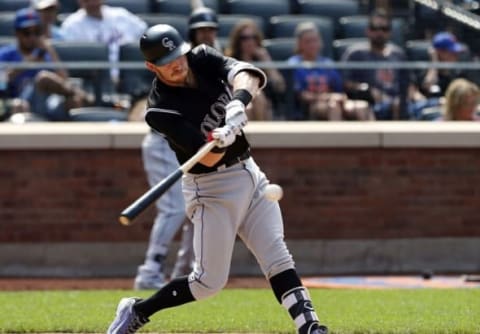
SS Trevor Story, Colorado Rockies
415 PA, .272/.341/.567, 67 R, 27 HR, 72 RBI, 8 SB
Despite having his season end on July 30 with a thumb injury, Trevor Story still leads all rookies in home runs and RBI and is second among rookies in runs scored. Also, no rookie with at least 300 plate appearances has a higher slugging percentage than Story’s .567. Of course, Story came out of the gate as hot as a Carolina Reaper. He hit seven home runs in his first six games. It was on an incredible hot streak of home run hitting.
At the all-star break, he had 21 home runs, just three short of Troy Tulowitzki’s rookie record for National League shortstops. Story surpassed Tulo’s record on July 23, then added a couple more to his total before injuring his thumb. His season is over, but he still currently holds the record for home runs by a National League rookie shortstop. Unfortunately for Story, there’s a rookie shortstop on the Dodgers with 24 home runs and counting.
Whenever a Colorado player is up for a hitting award, you have to look at his home/road splits. Story is a fitting example. At Coors Field, he hit .313/.393/.693, with a .382 Batting Average on Balls In Play (BABIP). On the road, it’s a different Story. Away from his hitter-friendly home ballpark, he’s hit .235/.292/.454, with a .307 BABIP. How those numbers will sway the voters remains to be seen. I have him third in my top five, but the two players behind him could make their moves.
Next: The Veteran Candidate
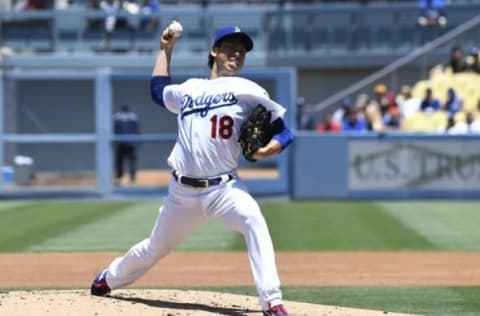
SP Kenta Maeda, Los Angeles Dodgers
153 IP, 14 W, 3.29 ERA, 1.08 WHIP, 9.2 K/9
If not for his teammate at shortstop, Kenta Maeda could have followed in the footsteps of former Dodger pitcher Hideo Nomo, who won the 1995 NL Rookie of the Year Award. Nomo was 13-6 with a 2.54 ERA that season. Maeda currently has 14 wins and a 3.29 ERA with another five starts or so to add to those numbers.
The Dodgers signed Maeda in January to an eight-year, $25 million contract that includes $10 million per year in incentives for starts and innings pitched. The deal could total $90 million over the course of the eight years. Before coming to the U.S., Maeda won 97 games with a 2.39 ERA in eight seasons in the Japan Central League. He won the Sawamura Award as the league’s best pitcher in both 2010 and 2015.
Maeda also competed for the Japanese national team in the 2013 World Baseball Classic. At the time, he said he would take advantage of the opportunity to face high-level competition to determine whether he could compete in Major League Baseball. In the pool rounds, he pitched 10 scoreless innings and was 2-0. He lost the a semi-final game against Puerto Rico, but allowed just one run in five innings and was named to the all-tournament team.
In his first four starts against big league hitters, Maeda was dominant, going 3-1 with a 0.36 ERA and 23 strikeouts in 25 1/3 innings. He hasn’t been quite that good since that first stretch of games (11-8, 3.88 ERA since April 28), but has been one of the few consistent options for the Dodgers this season. He leads the team in starts and innings pitched and he and Scott Kazmir are the only two Dodgers starting pitchers with more than 16 starts this year. He’s having a very good rookie year, just not as good as the guy playing behind him at shortstop…
Next: The Leader in the Clubhouse
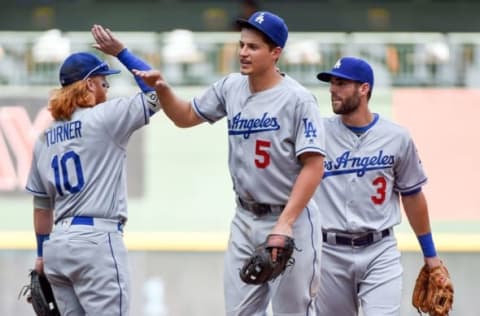
SS Corey Seager, Los Angeles Dodgers
Corey Seager should follow in the footsteps of last year’s NL Rookie of the Year, Kris Bryant, and receive all of the first place votes for this year’s award. As good as Bryant was last year, Seager has been ever better this year. He’s currently leading all NL rookies with over 300 plate appearances in batting average and on-base percentage, and is second in slugging.
When it comes to rookie National League shortstops, Seager is having a historic season. He’s already been worth more Wins Above Replacement (per Fangraphs) than any rookie shortstop in National League history. He’s three home runs from tying the NL rookie record for shortstops that Trevor Story set earlier this season and has a good chance to finish in the top five all-time for hits and runs scored in a season by a rookie NL shortstop.
Seager’s success shouldn’t be surprising. He was the Dodgers’ first round pick in the 2012 draft and has been a top prospect for the last three years, moving from #37 to #5 to #1 on the Baseball America Top 100. He came up in September last season and hit .337/.425/.561 in his first 27 big league games. Not only will he be the slam-dunk winner of the NL Rookie of the Year Award, he’s also a contender for the NL MVP Award.
Next: Top five AL Rookie of the Year candidates
Seager has been at his best when the Dodgers needed him most. Clayton Kershaw made his last start on June 26. Since then, Corey Seager has hit .342/.405/.543 and helped the team go 37-24 without Kershaw. When he collects his trophy for NL Rookie of the Year after the season, he will add one more to the Dodgers impressive number of great rookie players.